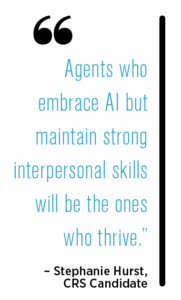By Rachel Arterberry
The real estate game is changing fast, and AI is leading the charge. From automating routine tasks to enhancing customer engagement, AI is proving to be an invaluable tool for real estate agents and brokerages alike. “AI isn’t replacing agents—it’s giving them superpowers,” says Stephanie Hurst, CRS Candidate, a Luxury Property Specialist at Coldwell Banker, RPM Group, in Little Rock, Arkansas. “The key is learning how to use it effectively to enhance, not replace, human expertise.”
Upcoming AI Technologies in Real Estate
AI is reshaping the real estate world, making agents’ jobs easier and helping them connect with clients more effectively. One of the game-changers is ChatGPT, which helps agents write irresistible property descriptions that grab buyers’ attention right away. AI-powered chatbots on real estate websites are also a big win, offering instant responses to inquiries and turning website visitors into potential clients with ease.
Predictive analytics is stepping up the game by giving agents a clear view of market trends and investment opportunities. As Stephanie Hurst explains, “AI allows us to anticipate market trends before they happen. Agents who leverage predictive analytics can make smarter decisions and stay ahead of the competition.”
Virtual tours and augmented reality (AR) are changing the way buyers experience homes, letting them take 3D tours of properties from the comfort of their own homes. This tech makes house-hunting faster and more convenient, saving everyone time. AI-powered CRM systems are also streamlining the process, automatically following up with leads, scheduling meetings and personalizing marketing to keep clients engaged.
These AI tools aren’t just about saving time—they’re all about creating a better, more seamless experience for buyers and agents alike, helping real estate businesses stay ahead in a fast-moving market.
Essential Skills for Agents in an AI-Driven Market
While AI offers numerous advantages, it is not a substitute for human interaction. Instead, it should be viewed as a tool to enhance agents’ skills and efficiency. To remain competitive, real estate professionals should develop the following capabilities:
Tech Savviness: Understanding how to use AI tools, CRM systems and online marketing platforms is key to keeping up in today’s real estate world.
Relationship Building: No matter how advanced technology gets, real estate is all about people. Agents need to focus on building strong client relationships, offering personal experiences and bringing that human touch that AI can’t replicate.
Authentic Branding: While AI can help create content, it’s a real estate agent or broker’s real personality that makes them stand out. Engaging with clients through video marketing and social media helps build a brand that feels real and approachable.
Reading the Data: AI can offer helpful insights into what buyers want, market trends and great investment opportunities, but knowing how to interpret this data is where agents will separate themselves from the pack.
Adaptability and Learning: As AI is constantly evolving, agents must remain flexible and continually learn about new tools and trends to stay competitive.
“Agents who embrace AI but maintain strong interpersonal skills will be the ones who thrive,” Hurst emphasizes. “People still want to buy from people they trust, not just an algorithm.”
Long-Term Strategic Planning with AI
Integrating AI into real estate is a smart, long-term investment that can help future-proof businesses. By strategically adopting AI tools, agents can streamline operations and boost efficiency, allowing them to focus on higher-value tasks and improve their overall productivity.
One of the first steps is automating routine administrative tasks like email responses, appointment scheduling and document processing. This frees up agents to engage more with clients and close deals, making their daily workflow more effective. AI-powered marketing tools also help by targeting the right audience for listings, ensuring properties reach those most likely to buy, which improves exposure and lead conversion rates.
Predictive analytics and CRM systems are also game changers in the real estate industry. By analyzing market data, real estate agents can make informed decisions on pricing and investments, while personalized content and communication improve client engagement and satisfaction. “Long-term success in real estate will come from a blend of technology and human insight,” Hurst says. The future of real estate and long-term success is about leveraging AI to enhance the human side of the business.
The Future of AI in Real Estate
As AI continues to evolve, the real estate industry must strike a balance between embracing new technologies and preserving the personal touch that clients deeply value. Rather than replacing agents, AI is here to empower them—making their work more efficient and helping them provide even better service. However, this requires real estate professionals to maintain a forward-thinking approach, utilizing all available resources in an increasingly digital world.
“The future belongs to those who embrace change,” Hurst says. “And AI is the biggest change our industry has seen in decades.”








